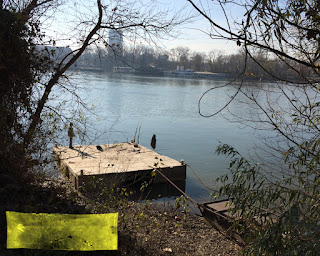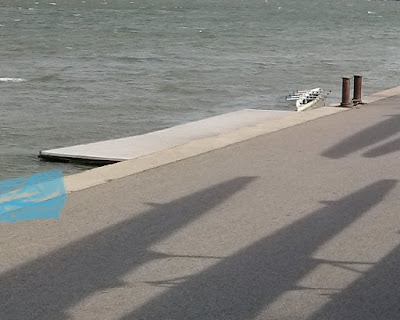wounds, talent
When it was 10F last week, I was really careful to avoid the ice. My hair froze. I could not feel my face. But just as I was almost home, I fell, and not because I wasn't looking but because I was tripped. At first, it seemed too bizarre to be true, but what can I say. Moving on.
Though my knees are still oozing, one still swelling up at will; though there's nothing like being seen by colleagues limping down a set of stairs, or managing the scab-related litany (it's no longer Halloween to parade it!), it seems like I am beginning to get something out of this experience. Like, use out of my Mueller jumper's knee strap as of my return to running yesterday. But, seriously: I gained some time.
And now I sit at this computer and write, as fireworks are already going off - and will do so through the second new year in January. I am rarely a fan, but with my newly found time as I read a poem by Pindar, I found the fireworks perfect accompaniment to his paeans of physical glory.
In an ode to Epharmostus, Pindar includes a passage in the middle about the victor's earlier triumphs (a "now and then"!), showing how our hero, though young, was not allowed to compete with youths, so was faced with elder rivals - who one imagines to be more experienced, and manages to endure and prevail - and the drama of this suspense cedes to cheers reverberating in the arena, which you can practically feel as you read:
Sometimes when I read Pindar, I stop reading his message and dwell instead on the characters or themes he brings up in a single poem, and forge my own associations, imagine my own poem.
This poem (Olympian 9) mentions a character called Telephus. He is mentioned in the poem as a stand-in for the concept of foe - a counter to a faithful character (Patroclus) born of the land that produced our athlete victor.
Pindar does not mention here that Telephus was wounded by Achilles, nor how the wound would not heal so Telephus consulted the oracle at Delphi and learned that what had wounded him would heal him. To skip to the end of this story: scraps of the weapon that had injured him were rubbed on the wound, which then healed. Frazer cites this as an example of "sympathetic magic" in his Golden Bough.
It is interesting to consider the relationship between what ails and cures. This is almost a holiday message.
But that is not all that I want to share in this holiday post, because there's a depth to ailments when other bonds with nature are strained.
In my case: trying to accept who I am without that urgent flailing towards "better", whether this means the so-far unsuccessful attempt to run faster, or the attempt to develop always further academically out of a pressing sense of responsibility ("must have it in case I need to give it!) To all this, Pindar says: natural talent is far better than learned abilities, especially where the latter lacks the divine component. In his words:
Though my knees are still oozing, one still swelling up at will; though there's nothing like being seen by colleagues limping down a set of stairs, or managing the scab-related litany (it's no longer Halloween to parade it!), it seems like I am beginning to get something out of this experience. Like, use out of my Mueller jumper's knee strap as of my return to running yesterday. But, seriously: I gained some time.
And now I sit at this computer and write, as fireworks are already going off - and will do so through the second new year in January. I am rarely a fan, but with my newly found time as I read a poem by Pindar, I found the fireworks perfect accompaniment to his paeans of physical glory.
In an ode to Epharmostus, Pindar includes a passage in the middle about the victor's earlier triumphs (a "now and then"!), showing how our hero, though young, was not allowed to compete with youths, so was faced with elder rivals - who one imagines to be more experienced, and manages to endure and prevail - and the drama of this suspense cedes to cheers reverberating in the arena, which you can practically feel as you read:
in Marathon, torn from beardless antagonists, he stood the onset of older men for the silver vessels. He threw these in his speed and craft with no fall scored against him and walked through the ring to loud acclamation in the pride of his youth
Sometimes when I read Pindar, I stop reading his message and dwell instead on the characters or themes he brings up in a single poem, and forge my own associations, imagine my own poem.
This poem (Olympian 9) mentions a character called Telephus. He is mentioned in the poem as a stand-in for the concept of foe - a counter to a faithful character (Patroclus) born of the land that produced our athlete victor.
Pindar does not mention here that Telephus was wounded by Achilles, nor how the wound would not heal so Telephus consulted the oracle at Delphi and learned that what had wounded him would heal him. To skip to the end of this story: scraps of the weapon that had injured him were rubbed on the wound, which then healed. Frazer cites this as an example of "sympathetic magic" in his Golden Bough.
It is interesting to consider the relationship between what ails and cures. This is almost a holiday message.
But that is not all that I want to share in this holiday post, because there's a depth to ailments when other bonds with nature are strained.
In my case: trying to accept who I am without that urgent flailing towards "better", whether this means the so-far unsuccessful attempt to run faster, or the attempt to develop always further academically out of a pressing sense of responsibility ("must have it in case I need to give it!) To all this, Pindar says: natural talent is far better than learned abilities, especially where the latter lacks the divine component. In his words:
That which is inborn is always the best; but many men strive to win glory with excellence that comes from training. Anything in which a god has no part is none the worse for being quelled in silence. For some roads lead farther than others ... The paths to skill are steep things to winSo as the fireworks continue to rumble in this little city that produces so much light, I leave you with the idea of catharsis: for wounds, but also for a recognition of the talents "inborn" - what is sought is found. Here's to the endeavour!
Brush: Misprinted Type.






Comments
Post a Comment